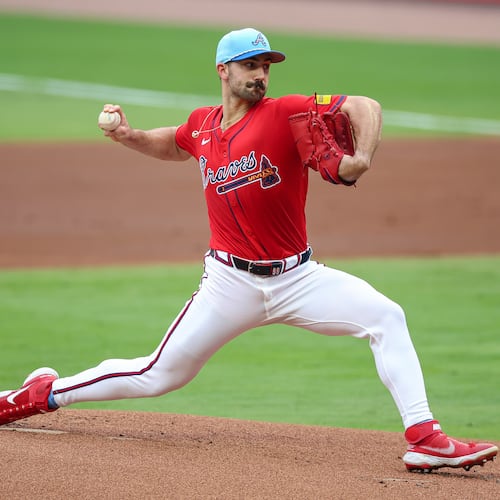OAKLAND, Calif. — When Bryce Elder walked off the mound Tuesday night, he had the lowest ERA in baseball among qualified starting pitchers.
Asked about this, he responded like Bryce Elder would.
“I mean, it’s nice,” he said. “I think I got a pretty good ways to go. I think I could still get better. I think I’ve been making pitches that have allowed that to happen. But I think I’m 11 starts in, and in a full year, you make about 30 to 35. It’s not quite a third, so we got a long way to go.”
This quote, in a sense, is Elder. He’s proud of himself to this point, but won’t ever brag. He hasn’t become complacent – and really, that’s probably one reason he’s improved this much.
He perhaps is the most pleasant surprise on the Braves this season.
He’s one of the better stories in baseball right now.
Let’s put his incredible start – and his stretch, dating to last season – into context.
1.92
By holding Oakland to a run over 7-1/3 innings, Elder lowered his ERA to 1.92.
He’s ahead of names such as Shane McClanahan, Luis Castillo, Spencer Strider and Zac Gallen. He’s ahead of everyone.
Since 1995, only eight Braves starting pitchers have posted an ERA of 1.92 or lower through their first 11 starts of a season. Elder is one of them. The last to do it was Michael Soroka in 2019 (1.92 ERA).
Greg Maddux did it twice. Tom Glavine, Julio Teheran, Shelby Miller, Brandon Beachy and Jair Jurrjens also accomplished it.
The first two are Hall of Famers. That’s good company for Elder.
A ridiculous run since Aug. 14
Elder is receiving more attention this season, but this really goes back to the second half of last season.
Over his past 16 starts – dating to Aug. 14 – Elder has a 1.83 ERA.
Here’s the list of players with a lower ERA over that span.
…
…
…
There are none.
Elder is one of only four pitchers in Braves history to post a 1.83 ERA (or better) over a span over 16 starts.
The others: Maddux, Glavine, Kris Medlen and Kevin Millwood.
Here’s something else that’s remarkable: Elder has logged 16 consecutive outings of at least five innings pitched.
Keeping the ball on the ground
Baseball Savant allows people who don’t work for a baseball team to view and learn about different analytical metrics that give a fuller picture of a player or team’s performance.
One quick scan of Elder’s Baseball Savant page might lead you to believe he’ll regress soon. His hard-hit rate is in the bottom 10% in baseball, which is not good. The average exit velocity against him is in the 13th percentile. Plus, he doesn’t throw as hard as many other starting pitchers.
It might seem like a recipe for bad results.
But you have to factor in this: His ground-ball rate – or how often hitters hit balls on the ground against him – is 57.5%. So, perhaps hard-hit rate and exit velocity matter a bit less if he’s getting batters to hit grounders right at his infielders. He knows how to use his sinker and slider to keep the ball out of the air.
“I think I said something to somebody: When he’s pitching, I’m getting at least four or five ground balls,” Austin Riley said. “His sinker, everything’s kind of barreling down. He’s locating, throwing pitches for strikes. Doing everything you can ask for.”
And “hard-hit” balls are defined as any hit at 95 mph or harder. A 97 mph ball off a bit is different from one hit at 107 mph. This is why exit velocity can be tricky. You need to look at the specific balls put in play against Elder.
Will he carry a sub-2.00 ERA through the end of the season? Probably not. Could he experience some regression? Sure. Pitching is difficult.
But he deserves praise. He’s putting together a great season right now.
The big picture
Toward the end of spring training, the Braves optioned Elder. At the time, Jared Shuster and Dylan Dodd were pitching better, and the Braves wanted to continue to see them make Grapefruit League starts.
And because of this, Elder didn’t make the team out of camp.
But going into a season, teams know they’ll need more than five starting pitchers.
And when Max Fried sustained an injury, the Braves recalled Elder. He has kept his rotation spot since and has provided stability while the Braves are without Fried and Kyle Wright.
Where would the Braves be without Elder?
In April, Ian Anderson underwent Tommy John surgery. The Braves weren’t ready to bring up Soroka until this week. Shuster and Dodd both made two starts at the beginning of the season, then were optioned.
Fortunately for the Braves, Elder has exceeded expectations.
“He’s always known how to pitch, ever since I’ve known him, so it’s no surprise to see him doing this well and keep having quality start after quality start,” Shuster said of his fellow starting pitcher. “I don’t know if anyone’s surprised by it, but it’s awesome to watch.”
About the Author
Keep Reading
The Latest
Featured



